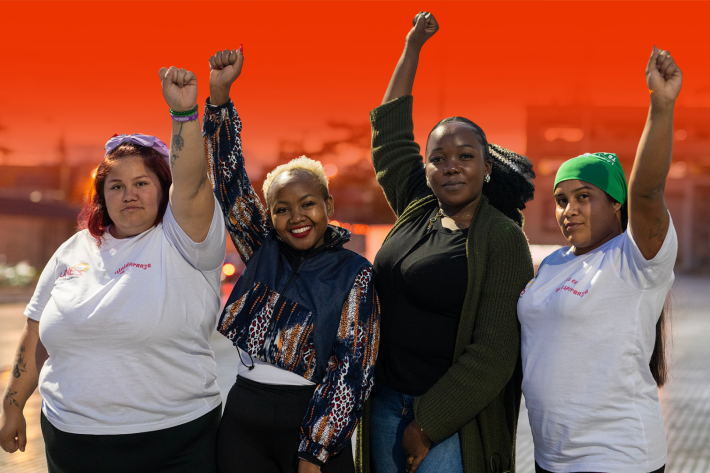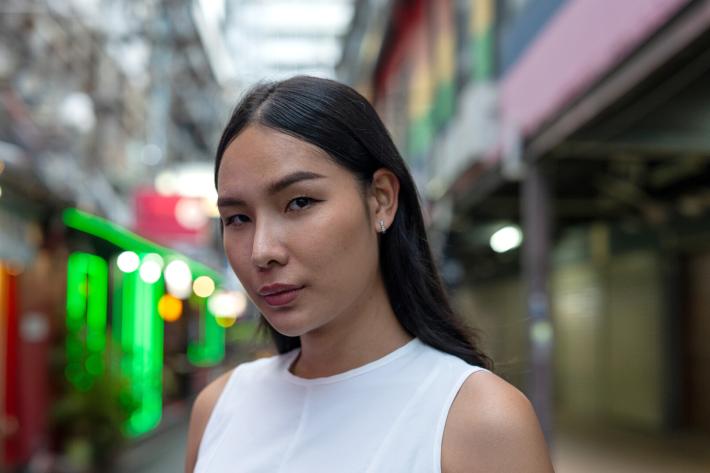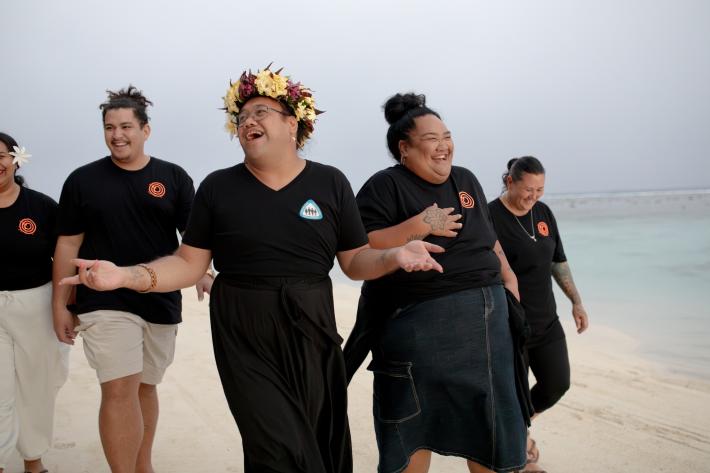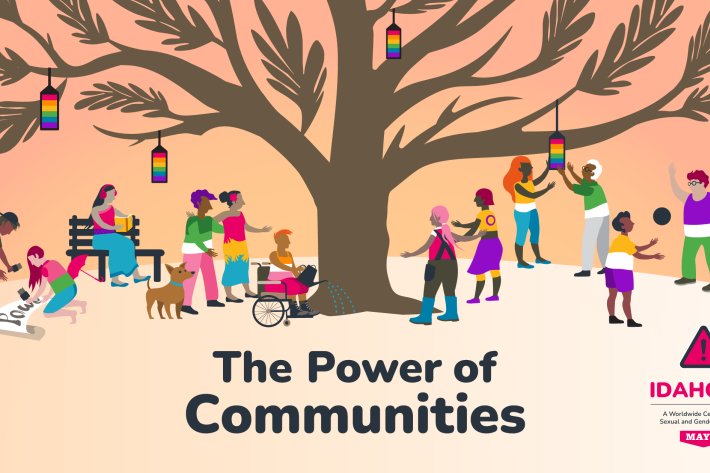
Spotlight
A selection of news from across the Federation
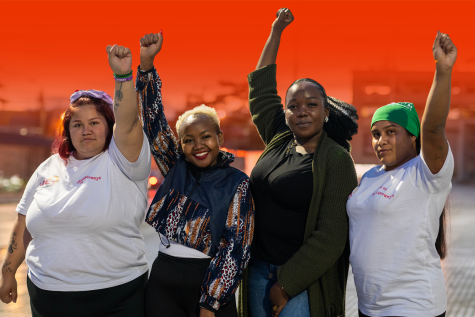
We Made It a Charter: IPPF’s Declaration of Values
Proud, bold, and united: we are values-led.
Filter our news by:


| 07 November 2024
The US Election outcomes are a call to strengthen our movement
Statement by our Director-General, Dr Alvaro Bermejo, on the Trump re-election We woke up to the disturbing news yesterday that Donald Trump is heading back to the White House. As ever, this has come as a huge shock, so firstly, let me express my condolences to all in the United States – and in countries where the U.S. contributes aid - whose reproductive destiny will be forever altered. This is not the news we wanted, nor the result that our Member Association in the United States, PPFA, worked so hard to achieve. We anticipate Donald Trump will sign an executive order almost immediately after inauguration January 20, 2025, to reimpose an expanded Global Gag Rule. As in the past, IPPF will refuse the conditions of the Global Gag Rule. We stand in solidarity with all our Member Associations impacted. Our world has changed, and so we must also acknowledge our MA’s who have been impacted by the horrific attacks on Gaza, on Lebanon, Syria and elsewhere. Over the past year, our teams in Palestine and Lebanon have had their health sites destroyed, and their staff displaced. We will continue to demand sexual and reproductive rights for ALL, no matter where. We will continue to make the links to sexual and reproductive violence where we see it and call out governments who enable it. Our feminist humanitarian response, our new strategy and our commitment to international human rights law makes this a moral imperative. In all this tragedy, comes a glimmer of hope. An opportunity for our movements to reconfigure, to reclaim our space, and bring progressive struggles together. We will resist. This is an invitation to Come Together, to work in solidarity, and to commit to building a liberated future. On we must fight. We must organise, it must begin, and it begins now.

| 30 October 2024
Our statement on the ILGA Board World position on the Tel Aviv bid for the 2026/2027 World Conference
NEWS ALERT: In an emergency meeting held this weekend, the ILGA World Board unanimously decided to remove a bid from The Aguda, a member organisation based in Israel who proposed to host their next World Conference in Tel Aviv. This means the bid will not go forward, nor put to a vote at the upcoming World Conference in Cape Town, South Africa. At its meeting, the ILGA World Board also decided to suspend the organisation from their membership, as their current actions could violate the ILGA World Constitution. In recognition of the historical experience with apartheid and colonialism in South Africa and their unequivocal solidarity for the Palestinian people, ILGA World apologised for the anger and harm this bid caused at a time whilst a plausible genocide is taking place. Through Kalavai, a truly intersectional, cross movement partnership, ILGA World is a critical partner of the International Planned Parenthood Federation. We recognise that our future requires solidarity and moral courage. With the defunding of grass roots organisations, and mounting pressure on organisations to turn the other way, to collude in silence; IPPF acknowledges the leadership of ILGA World – and many others, including most recently members of the Centre for Feminist Foreign Policy. We stand in solidarity. We stand against reproductive and sexual violence. We stand against genocide and the deliberate destruction of international humanitarian law. We call on sister organisations to keep speaking, to tell the truth, to ensure our movement stands the test of time. We stand in solidarity with girls and women in all their diversity, with LGBTQ people, with our sisters in Palestine, Lebanon, Syria, the DRC, Sudan, Myanmar and elsewhere. We demand sexual and reproductive rights for ALL.
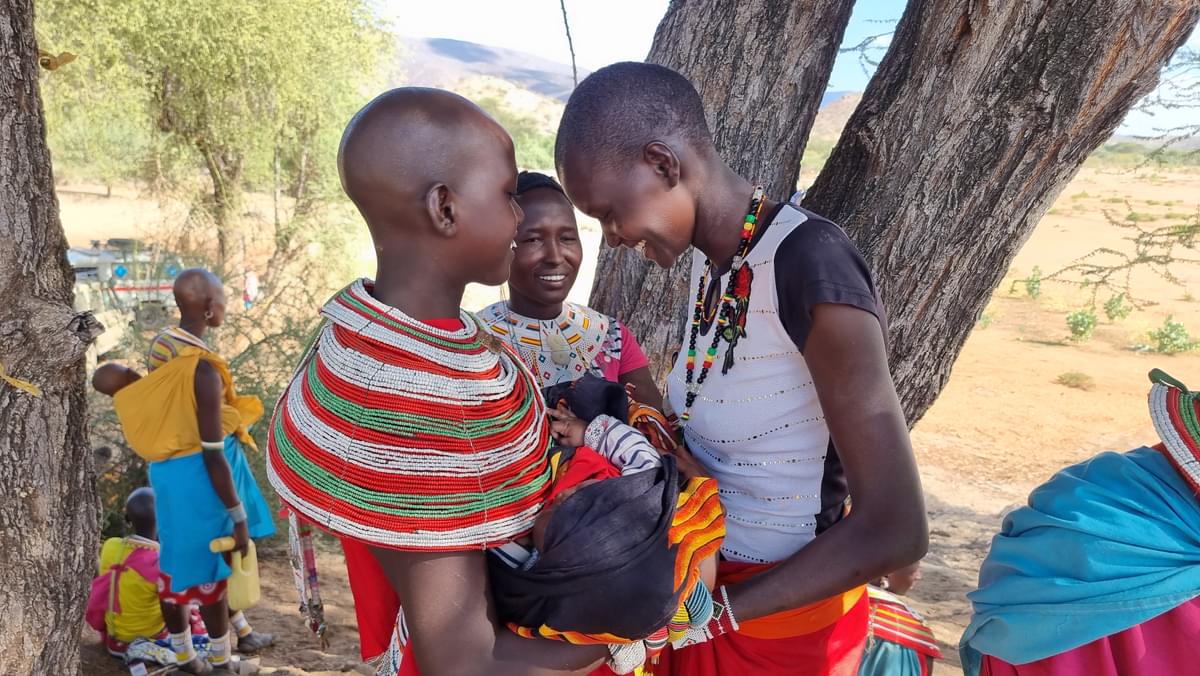
| 30 September 2024
EmpowHER: IPPF Announces New Global Initiative to Empower Women, Girls, and Marginalized Communities
The International Planned Parenthood Federation (IPPF) has launched the CAD48 million "EmpowHER" project in partnership with Global Affairs Canada. The initiative aims to improve sexual and reproductive health and rights (SRHR) for marginalised women, girls, and underserved communities across at least 11 countries. EmpowHER will enhance access to sexual and reproductive health (SRH) care, deliver comprehensive sexuality education, and combat growing threats to SRHR through policy reform and advocacy. This partnership aligns with Canada’s commitment to gender equality and empowering young people to make informed choices about their well-being. Ensuring Inclusive SRHR Delivery for Women, Girls and Marginalise Communities (EmpowHER), is a large-scale initiative that will strengthen access to SRHR for the most marginalised and underserved groups, particularly women and girls. It will support millions of women, girls, and vulnerable communities in Burkina Faso, Democratic Republic of Congo, Ghana, Guinea, Guinea-Bissau, Kenya, Mauritania, Sudan, Zambia, Uganda, Togo, Colombia, Ecuador and Pakistan. Through an intersectional, human rights-based feminist approach, EmpowHER will increase access to much needed rights-based SRH care, including access to person-centred safe and legal abortion care. It will deliver critical comprehensive sexuality education (CSE) to empower young people to act on their sexual and reproductive rights (SRR) by expanding their access to quality, rights-based, and gender-sensitive CSE. Furthermore, this initiative will also counteract the growing threats to women’s and girls' sexual and reproductive health rights, by providing urgent support to improve policies and strengthen the capacity of movements and coalitions. Dr. Alvaro Bermejo, Director-General of IPPF, emphasised the critical need to protect and expand access to SRHR. “This new project will continue our mission of empowering women and girls, particularly in Sub Saharan Africa, to make informed decisions about their bodies. We will not only increase access to much needed SRHR services including safe and legal abortion but will also deliver CSE to young people and tackle the rollback of SRHR rights.” “We’re grateful to the Canadian Government for their support and continued partnership.” The funding, unveiled during the United Nations General Assembly (UNGA), is part of Canada’s 10-Year Commitment to Global Health and Rights and aligns with its Feminist International Assistance Policy. Canada is committed to securing a more gender-equal world in which young people are empowered to exercise their rights and make free and informed decisions about their sexuality and well-being. "By supporting the EmpowHER initiative, Canada is taking another step towards achieving gender equality and empowering women and girls, in all their diversity, worldwide. This project will not only improve access to vital sexual and reproductive health services, but also ensure that the most marginalized communities can exercise their rights and make informed choices about their health and future. Together, we will strengthen partnerships that champion these rights and protect the progress we've made", said the Honourable Ahmed Hussen, Minister of International Development, Canada.
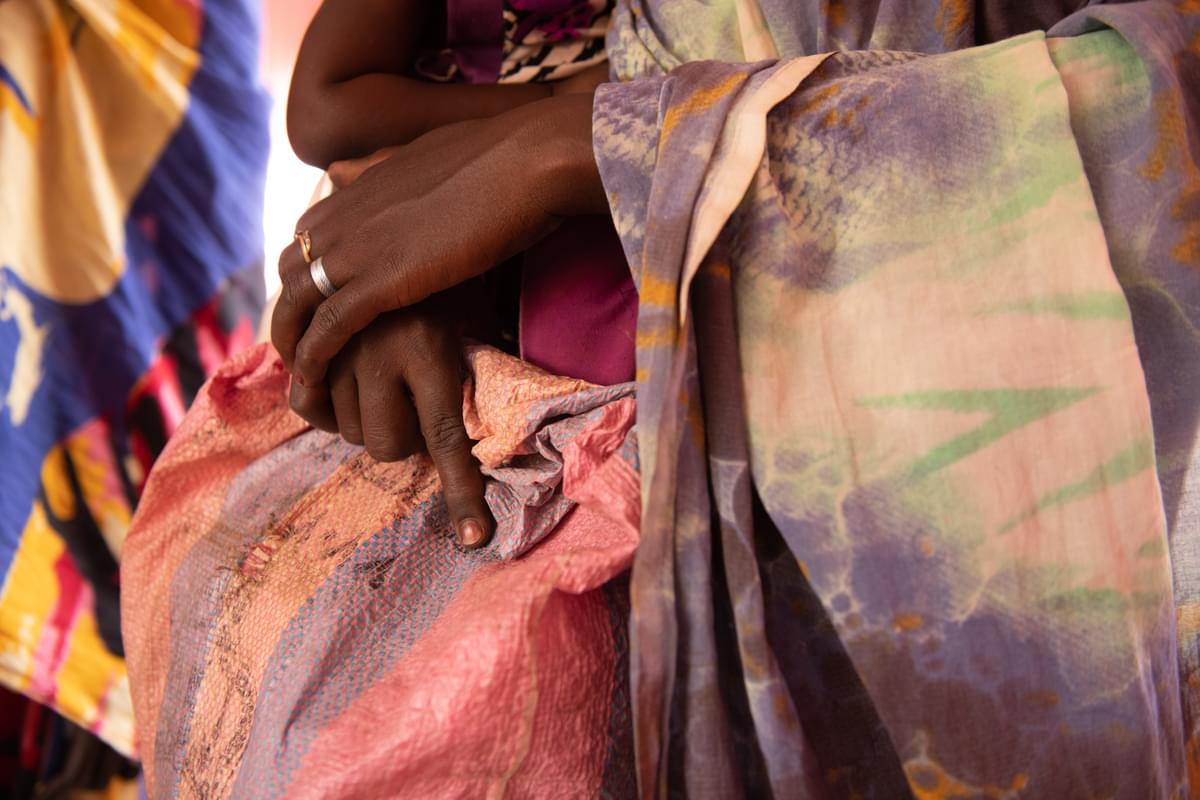
| 26 September 2024
Sudan re-launches e-platform, providing essential reproductive health services
In light of the ongoing conflict in Sudan since April 15, 2023, the Sudan Family Planning Association (SFPA) has re-launched its electronic platform to provide essential rights-based reproductive health services. Current technical challenges in Sudan, caused by the ongoing conflict, has disrupted many essential services, including access to family planning and reproductive health care. The e-platform is being relaunched to ensure that we can continue providing rights-based, essential services to those in need, particularly women and youth, even during these difficult times. Since the platform’s inception, it has already reached over one thousand clients, many of whom are in rural or conflict-affected areas. It has also provided psychological support and legal advice to women suffering from abuse in conflict areas, which demonstrates the platform’s vital role. This initiative, supported by the Federal Ministry of Health and state ministries, aims to strengthen the affected health system and improve access to vital services during this challenging period. Key services available through the phone number 1700 include: Comprehensive reproductive health consultations. Response to gender-based violence (GBV) with psychological and legal support. Secure and confidential remote consultations via video calls. The project aims to: Enhance access to reproductive health services, particularly in conflict-affected areas. Support vulnerable groups such as women and youth with comprehensive health consultations. Strengthen the national health system in partnership with the Ministry of Health and international partners. Elshafie Muhammed Ali, Executive Director, Sudan Family Planning Association, said: "We hope this initiative will contribute to alleviating the impact of the crisis and improving the quality of life for the Sudanese population. The lack of reaction from the UN and the international community is heartbreaking. So much is left for the Sudanese people to deal with. SFPA and IPPF stand by the women and girls of Sudan, even if the world looks away." The total number of people who fled their homes since mid-April 2023 is 10.3 million - or every fifth person in the country - making this the largest displacement crisis in the world. This includes about 8 million people displaced within Sudan and another 2.3 million who crossed into neighbouring countries. The United Nations Population Fund (UNFPA), estimates that 6.7 million Sudanese people, mostly women, are at risk of gender-based violence (GBV).
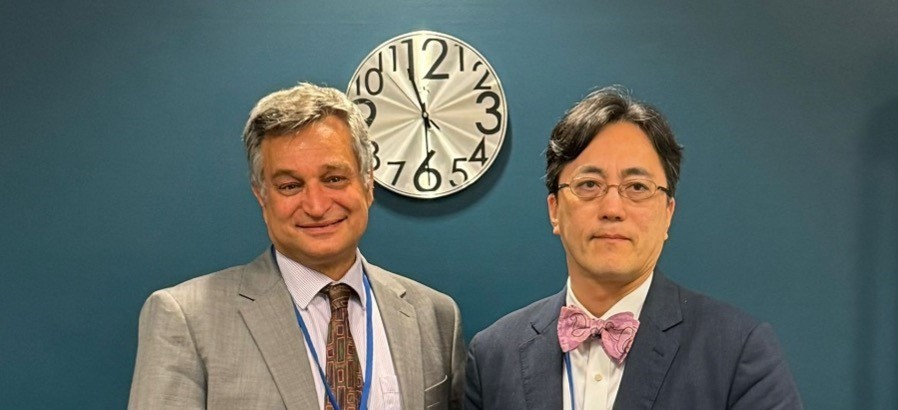
| 02 October 2024
IPPF Director General and Japanese Ambassador Agree to Further Cooperation between Japan and IPPF
25 September 2024, New York - During his visit to New York to participate in the Future Summit and the UN General Assembly, IPPF Director General Dr Alvaro Bermejo held a side bilateral meeting with Mr Kazuhiko Nakamura, Director General and Assistant Minister for Global Issues, Ministry of Foreign Affairs of Japan to promote universal health coverage and women, peace and security. Dr Bermejo thanked the Government of Japan for the long-standing cooperation with and its consistent support since 1969. Dr Bermejo introduced IPPF and its Member Associations and Collaborative Partners operating in 152 countries, stating that in 2023, IPPF provided 22.4 million services to 71.4 million people worldwide. He further stated that in 2023, thanks to support from the Japanese Government's supplementary budget, IPPF was able to provide life-saving sexual and reproductive health and rights (SRHR) services to 291,723 people in crisis across four countries; namely Afghanistan, Ethiopia, Pakistan and Ukraine. He stressed that the IPPF and its Member Associations are playing an important role in the growing need for humanitarian assistance worldwide due to the effects of global climate change and increasing conflicts. He also confirmed that the IPPF is actively working on Women, Peace and Security (WPS) issues, which Japan attaches great importance to. Dr Bermejo also referred to the importance of Universal Health Coverage (UHC), Japan's leadership and notable pioneering initiatives and activities in this area. In response, Mr Kazuhiko Nakamura, Director General and Ambassador for Global Issues, stated that SRHR is a fundamental component of UHC and that progress in SRHR is essential to achieve UHC. Furthermore, these Mr Nakamura and Dr Bermejo agreed that Japan and the IPPF will further strengthen their cooperation, as it is impossible to fully realise UHC without addressing the SRH needs that the population has. In an increasingly polarised global situation regarding SRHR, Secretary-General Bermejo stressed the importance of balanced voices such as Japan as a bridge to facilitate dialogue in order to prevent global fragmentation. In particular, he noted the need for efforts to shift attention away from using SRHR as a political power struggle and towards the real issue of addressing ways and means to promote gender equality and health in particular.

| 23 September 2024
Major New Health Programme to Expand Sexual and Reproductive Health Services in East and Southern Africa
Nairobi, 23 September 2024 – A groundbreaking £75.125 million project has been announced by the International Planned Parenthood Federation (IPPF) and its partners, the International Rescue Committee (IRC), Options, Ipas, and Johns Hopkins University Centre for Communication Programmes, to transform sexual and reproductive health services across East and Southern Africa. This large-scale initiative will benefit seven countries, supporting millions of women, girls, and vulnerable communities in Burundi, Ethiopia, Madagascar, Somalia, South Sudan, Sudan, and Zambia. This programme, known as Women’s Integrated Sexual Health 2 (WISH 2) Lot 2, is funded by the UK Foreign, Commonwealth and Development Office (FCDO). As part of FCDO WISH Dividend, it builds on the successes of FCDO’s £272 million Women’s Integrated Sexual Health (2018-2024) programme, which spanned 27 countries across Africa and Asia. Over its lifespan, the first WISH programme supported over an estimated 16.9 million women and girls, helping them gain access to critical SRHR services. FCDO’s continued partnership with IPPF for this next phase of WISH was unveiled by FCDO's Chris Carter, on behalf of the UK Minister for Africa, Lord Collins, during the United Nations General Assembly (UNGA) side event, “SRHR: Securing reproductive choice for the next generation.” Announcing FCDO’s partnerships with IPPF, MSI Reproductive Choices and the Children's Investment Fund Foundation, Chris Carter noted the new programme will play a critical role in increasing women's voice, choice and control across 13 countries in Africa.” With the goal of delivering over seven million ‘couple years protection,’ the programme will address critical healthcare gaps, promote reproductive choice, and tackle harmful social norms. It will also provide urgent support to improve policies, strengthen health systems, and safeguard the reproductive rights of women and girls, especially in areas affected by conflict and displacement. At the heart of this initiative is a focus on reaching the most marginalised groups, including young women and girls under 20, those living in poverty, people with disabilities, and communities in conflict zones. Importantly, WISH2 will also work to improve access to safe abortion care and counteract the growing threats to women’s and girls' sexual and reproductive health rights. IPPF Director General Dr Alvaro Bermejo emphasised the critical need to protect and expand access to SRHR. “WISH2 will continue our mission of empowering women and girls across Africa to unlock their full potential. We will not only tackle the rollback of SRHR rights but also strengthen disability inclusion while delivering sustainable healthcare solutions,” said Dr Bermejo. “We’re grateful to the UK Government for their unwavering support in this important work.” Elshafie Mohamed Ali, Executive Director of Sudan Family Planning Association (SFPA) said “WISH2 is essential given Sudan’s current circumstances, particularly the ongoing conflict since April 15, 2023. The programme addresses the growing need for sexual and reproductive health services, offering crucial support to vulnerable communities amidst increasing instability and humanitarian challenges.” Chris Carter, Deputy Director, Head of Human Development Department, highlighted the impact of this new initiative: “Access to sexual and reproductive health services saves lives, empowers women and girls, and supports education, transforming lives and entire livelihoods. This project will amplify women’s voice, choice, and control across Africa, and we are proud to partner with IPPF and African organizations in this critical mission.” For media enquiries, please contact media@ippf.org

| 10 July 2024
IPPF Achieves Very High Performer Status in Global Health 50/50 Gender and Health Index 2024
Leading the Way: IPPF Ranked Among Top Global Health 50/50 PerformersIPPF is thrilled to announce that the International Planned Parenthood Federation (IPPF) has been recognized as a Very High Performer in the 2024 Global Health 50/50 Gender and Health Index! This prestigious designation, coupled with our classification as a Consistently Strong Performer in trend performance, reflects IPPF's unwavering commitment to achieving gender equality. Transparency, strong governance with gender parity, and actively closing the gender pay gap are all cornerstones of our mission as a feminist organization. This recognition by Global Health 50/50 validates our ongoing efforts to create a truly equitable environment, both internally and within the global health landscape. Professors Sarah Hawkes and Kent Buse, Co-CEOs of Global Health 50/50, acknowledged IPPF's leadership, stating, “Global Health 50/50 is pleased to recognise International Planned Parenthood Federation (IPPF) as a Very High Performer in our 2024 Report, 'Gaining Ground?'. We hope that International Planned Parenthood Federation (IPPF)'s efforts to advance equality and diversity inspires others. We look to them to continue to push this hard won progress forward for the people working in global health and around the world."We are inspired by their words and committed to furthering this progress for the benefit of our staff and the communities we serve worldwide. Read the report here.

| 26 June 2024
IPPF Statement Reacting to the SR VAWG's Report on Prostitution and Violence Against women and Girls
Stigmatising. Ideologically driven. Damaging. These are just a few words that can describe this report. The International Planned Parenthood Federation is a global feminist, sexual and reproductive health and rights organisation with decades of experience providing services to sex workers’ of all genders. We denounce in the strongest terms the content of this report and the ideologically driven process that led to it. The report ignores decades of international evidence and global recommendations by WHO, UNAIDS, Amnesty International - and more importantly sex workers themselves. Sex workers' voices have deliberately been ignored in the drafting of this report, reproducing the patriarchal silencing and exclusion that sex workers face in their daily lives. At times of increasing attacks on women’s and LGBTQI communities, this report is fuelling misconceptions and harmful stigmatisation. The report promotes policies consistently proven to violate sex workers’ human rights using human rights rhetoric and erase sex workers consent, agency and humanity At a time when racialised and migrant communities are increasingly calling to end police brutality and impunity, this report only offers more criminalisation and policing - putting the lives of most marginalised sex workers at risk. The International Planned Parenthood Federation support the full decriminalisation of sex work. and stands in full solidarity with sex workers, their organisations and their struggles for human rights. There is no feminism without sex workers. Sex work is work.

| 20 June 2024
Sex workers and feminist allies welcome UN human rights experts’ support for the full decriminalization of sex work
Major progress has been made in the debate on sex workers’ rights through a recent paper, “Eliminating discrimination against sex workers and securing their human rights,” published by the United Nations (UN) Working Group on Discrimination Against Women and Girls. In advocating for the full decriminalization of sex work based on international standards for strengthening women’s bodily autonomy and sexual and reproductive health, this guidance document is an important step toward a human rights-based approach to sex work for all UN bodies to follow. Unlike the sensationalist and reductive claims made by many anti-rights groups, the Working Group’s paper is grounded in evidence-based research and informed by consultations conducted with diverse sex workers across geographical regions, including those living with HIV and those who have experienced violence, exploitation, and abuse first-hand under restrictive policy models. “The position paper is not denying the injustices that occur in sex work, but merely highlighting the criminalisation of any aspect of sex work, and other punitive laws, policies and practices, that actually create these environments of violence, risk and abuse of sex workers,” as remarked by Jules Kim, Global Coordinator of the Global Network of Sex Work Projects (NSWP) during the launch of the position paper. Furthermore, the paper draws attention to recommendations by international bodies, including several UN Special Procedure mandate holders and UN agencies, calling for the removal of punitive provisions on sex work. Given the large body of evidence and the growing consensus among international human rights bodies regarding the situation of sex workers, the Working Group concludes that there is sufficient proof of the harms of any forms of criminalisation of sex work and calls for the full decriminalization of sex work as the most conducive model to ensure the human rights of sex workers. Under decriminalization, all forms of sex work-specific criminal and licensing laws intended to sanction sex workers, clients and people who operate with sex workers are removed. The Working Group found that “in jurisdictions which criminalize sex workers, violations of their rights are numerous.” This finding is supported by international best practice guidelines and a substantial body of evidence. Decriminalization is the legal framework favoured by most sex worker-led organisations worldwide, as well as leading authorities in health and human rights. In New Zealand, following the decriminalization of sex work in 2003, sex workers have reported improved working conditions, negotiation power, and increased confidence in asserting their legal and employment rights. Sex workers in New Zealand also report improved relationships with law enforcement and an increased likelihood of reporting incidents of violence to the police. In Australia, the New South Wales (NSW) Ministry of Health has found that the reforms that decriminalized adult sex work “improved human rights; removed police corruption; netted savings for the criminal justice system; and enhanced the surveillance, health promotion, and safety of the NSW sex industry.” Contrary to early concerns, the NSW sex industry has not increased in size or visibility. Most important, the Working Group emphasises that decriminalization does not impede states’ efforts to mitigate human trafficking, citing the 2020 report of the Special Rapporteur on trafficking in persons. If anything, decriminalization assists efforts to combat trafficking and exploitation in the sex work sector. The UN Special Rapporteur on contemporary forms of slavery has recently called for the full decriminalization of sex work to prevent further human rights violations against sex workers. As the Working Group’s position paper was being drafted, NGO members of the Sex Workers Inclusive Feminist Alliance (see membership list below) and sex workers from the Global Network of Sex Work Projects (NSWP) were respondents to the consultations. Sex workers from such organizations as the Kenya Sex Workers Alliance, the European Sex Workers’ Rights Alliance, Plataforma Latinoamérica de Personas que Ejercen el Trabajo Sexual, the Guyana Vulnerable Populations Alliance and the Asia Pacific Network of Sex Workers each briefed the working group on the challenges facing their constituents. Each one briefed the Working Group on the most pressing challenges facing sex workers in their regions, including the conflation of sex work and trafficking, an increasingly strong and coordinated anti-rights and anti-gender movement and rising calls for criminalization. These calls pose a serious threat to sex workers’ rights and fly in the face of the abundant evidence of increased discrimination and isolation of sex workers in countries where sex work is criminalized. The guidance paper exemplifies meaningful inclusion of sex workers’ voices in the drafting of policy recommendations. This inclusion will lead to changes that improve the conditions of people who do sex work, particularly those most at risk of violence, poverty and poor health. The working group joins several UN agencies that have long called for the decriminalization of sex work, including the UN Population Fund, the World Health Organization, the UN Development Program and the Joint United Nations Program on HIV/AIDS (UNAIDS). Originally published in PassBlue on May 31, 2024. SWIFA was formed as part of a long-term strategy of building alliances across the sex workers’ and feminist movements to advance the acceptance of sex workers’ rights within the women’s movement. Organisations in the alliance include: Amnesty International, CREA, FEMNET, Global Alliance Against Traffic in Women (GAATW), Global Network of Sex Work Projects (NSWP), International Women’s Rights Action Watch Asia Pacific (IWRAW Asia Pacific), Women’s Global Network for Reproductive Rights (WGNRR) and the International Planned Parenthood Federation (IPPF).
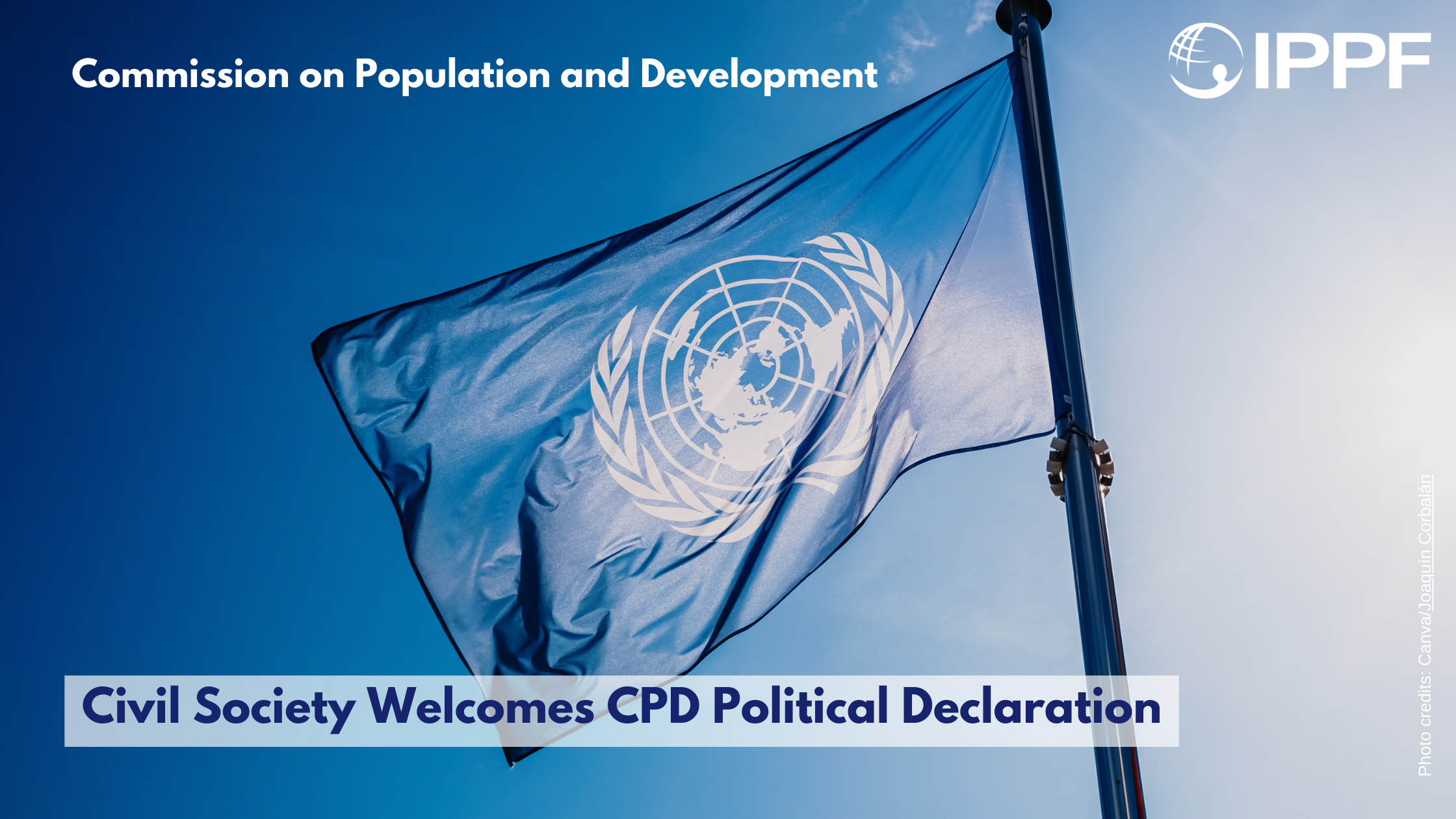
| 29 April 2024
Civil Society Welcomes CPD Political Declaration
The International Sexual and Reproductive Rights Coalition (ISRRC) celebrates the 30th anniversary of the International Conference on Population and Development Programme of Action (ICPD PoA) and the outcomes of its reviews and its transformative impact on the lives of women, adolescents, girls, and structurally excluded groups across all regions. The ISRRC members have, for the last thirty years, been implementing the PoA, directly impacting gender equality, human rights, and the sexual and reproductive lives of women, adolescents, and girls in all their diversity around the world. We celebrate the contributions and role of civil society, feminist and women’s movements and youth-led organizations in advancing the ICPD agenda. Our efforts have led to significant reductions in maternal mortality rates, increased access to reproductive health services, and improved gender equality in many communities. Three decades ago, world leaders made a groundbreaking declaration, recognizing sexual and reproductive health and reproductive rights as human rights. The ICPD PoA has not only transformed lives but remains a pertinent solution to today's complex problems. The world has evolved since 1994, presenting unprecedented uncertainties and multiple crises. In this context, the ICPD PoA is not just a historical document but a living agenda that demands immediate action and continuous advancement to address the intricacies of today's global challenges. The Political Declaration adopted at the 57th session of the Commission on Population and Development is a step towards ensuring accelerated action on the ICPD PoA, including its unfinished business. By reaffirming their commitment to the full implementation of the PoA and the follow-up to international and regional commitments, Member States are recommitting themselves to fulfilling sexual and reproductive rights for all and ensuring access to SRH services for young persons and adolescents, among other relevant issues. The inclusion of 'human rights for all', 'gender equality', and 'the empowerment of all women and girls' in the Political Declaration serves as a poignant reminder of the areas that demand immediate attention. The Political Declaration urges further action to scale up financing for sustainable development and references the right to development. The Political Declaration, just adopted by the CPD, stresses the interlinkages of the ICPD with 'relevant multilateral processes.' We call on Member States to bring the ICPD's goals and objectives to relevant multilateral platforms, in particular, the Summit of the Future and its outcomes. We welcome the contributions of additional ICPD+30 fora, including the Cotonou Global Youth Dialogue Call to Action and the Oslo Statement of Commitment from the 8th Inter Parliamentary Conference on the Implementation of the ICPD. We urge Member States to act now, emphasizing accountability for the ICPD agenda and its impact on the lives of women, adolescents, and girls in all their diversity. About ISRRC IPPF co-convenes the ISRRC, a cross-regional coalition of more than 100 civil society organizations from around the world, along with Countdown 2030 Europe, Red por la Salud de las Mujeres, Ipas, FEMNET, and ARROW.








